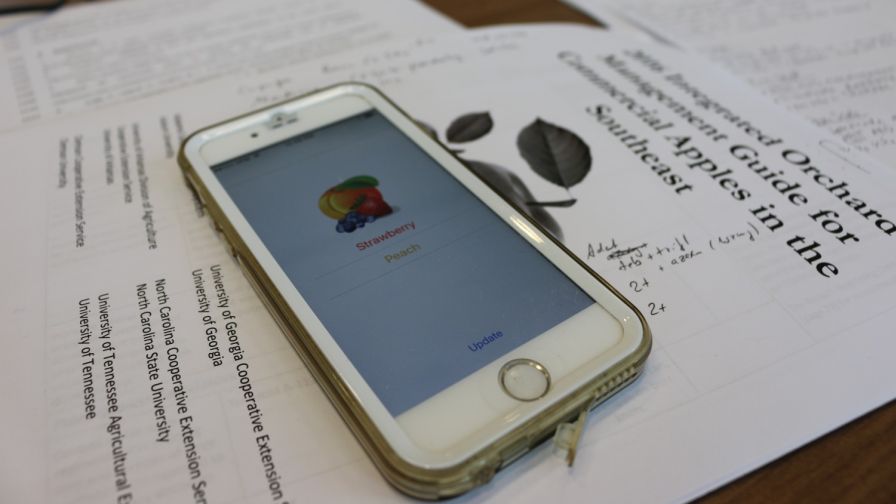More Apps Help Growers Identify Insects And Diseases

The MyIPM series of apps are available for Android and IOS devices. (Photo Credit: Scott Miller / Clemson University)
Following the release of MyIPM, Clemson University has expanded its smartphone app series with more crops covered.
With two new MyIPM apps, growers now have information on dozens of insects and diseases that attack peaches, blueberries, and strawberries (MyIPM-SED) as well as apples, pears, cherries, cranberries, and blueberries (MyIPM-NED). A third app (MyIPM-SEP) features advanced blueberry pest-control solutions and soon will feature the same for strawberries and peaches.
The three MyIPM apps are available at the Apple Store and Google Play. The NED version covers fruit crops preferentially grown in the Northeastern U.S., the SED and SEP versions cover crops preferentially grown in the Southern U.S.
The apps include tips on identifying and managing crop-threatening diseases with instructions for growers to manage disease resistance and submit pathogen samples for resistance profiling.
Initially tailored for peach and strawberry growers in the Southeast, the MyIPM smartphone app series created by Clemson Plant Pathologists Guido Schnabel and Mengjun Hu with Clemson Computer Scientists Greg Edison and Roy Pargas has been expanded through a collaboration with researchers from Cornell University, the University of Massachusetts, Penn State University, North Carolina State University, and the University of Georgia.
“With the app, growers can reference high-resolution images to help diagnose disease or identify pests,” Schnabel said. “Audio files with university scientists outline treatment and prevention options. Interactive tables outline effective chemical or organic control options, with research-based efficacy and toxicity profiles on dozens of commercial products. Information on the causal organisms, disease cycles, symptoms, biology, and pesticide-resistance management are also covered.”
“It is important that the app is available free to all growers, so they have access to this information regardless of the resources they may have to invest in new technology,” Schnabel said.
The MyIPM app is the only app of its kind, said University of Georgia Pathologist Phil Brannen, who collaborated with Schnabel on the project.
“Some of things we produce, which are really good resources, are more designed for the web and viewing on a computer screen. With this app and the photos and the identification tools that we have, it’s a readily available resource they can pull out of their pocket if they’re in the field,” Brannen said. “If they do identify a disease or an organism causing a disease, they’ll have treatment options at their fingertips immediately.”
Erika Saalau Rojas, an Extension Plant Pathologist at the University of Massachusetts Cranberry Station, said a mobile-diagnostic tool for growers had not been available in her state before MyIPM.
“What’s amazing about this app is that it’s very user-friendly,” she said. “Having the ability to view high-resolution pictures and being able to tell symptoms and signs, really streamlines the process of diagnostics.”
The MyIPM series is maintained at the Southern IPM Center, University of Georgia in Tifton, GA, and the back-end database allows regional experts to update information at any time, making the apps easy to keep up to date with the newest information as science evolves.










